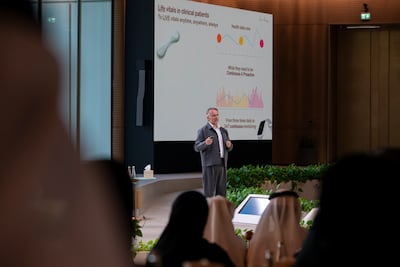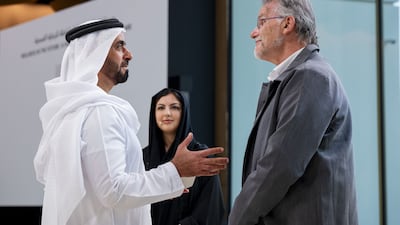As healthcare systems worldwide grapple with mounting pressures, Lucien Engelen, chief executive of Transform Health, delivered a powerful address at the Majlis Mohammed bin Zayed, urging a shift in how we approach health and patient care.
While artificial intelligence and digital technology hold promise, Mr Engelen said they aren’t "cure-alls". Instead, a balanced blend of digital innovation, prevention, and patient-centred care is needed to build a healthcare system that is both sustainable and accessible.
In his speech, Mr Engelen highlighted the tremendous strain facing healthcare systems today. “We’re facing what I like to call a ‘plumber’s problem’ in health care,” he said. “We wait until something breaks, then rush to fix it. Meanwhile, the underlying issues – burnout, financial pressures, staff shortages – are only worsening.”
He said that while technology often dominates discussions on the future of health care, true progress comes from addressing root causes. Social factors like education, income, and housing play a far larger role in health outcomes than many realise.
Root causes the key to health
“There’s a misconception that more healthcare spending will lead to better health outcomes," Mr Engelen said. "The reality is that health improvement comes from addressing the root causes – what we eat, where we live, and how we behave.”
While Mr Engelen cautioned against seeing technology as a silver bullet, he gave several examples of its transformative potential. “The progress is staggering,” he said. “We’re at a point where we can anticipate patient needs in real time, before a crisis happens."
However, he believes the real potential of technology lies in bringing health care into people’s daily lives. Pharmacies in the Netherlands, for example, have begun installing kiosks to allow patients to check vitals without going to a hospital.
“My question always was, why are we doing this only in hospitals?” he asked. “By integrating health monitoring into everyday spaces, we can reach people before they become patients.”
With health care becoming more data-driven, Mr Engelen also emphasised the need for clear ethical frameworks to protect privacy. “We need transparency – patients should know what data is collected and why,” he said. "When people understand the benefits and have control, they’re more likely to engage with new technologies in a meaningful way.”
A vision for health care’s future
Mr Engelen’s vision for health care goes beyond medicine, it’s about creating a system that balances health with economic growth. Citing studies that suggest every additional year of healthy life expectancy can boost a nation’s economy, he explained how an investment in preventive health care could have far-reaching benefits.
“Health care is on the brink of a Copernican shift,” he concluded. “By embracing technology and prevention, and by rethinking our approach to patient care, we can create a healthcare system that supports not only individual well-being but also economic resilience. And that’s a future worth striving for.”
Mr Engelen’s vision involves inviting a broad range of voices to the table, from healthcare providers and tech developers to patients and policymakers. The goal, he says, is to build a system that values prevention, supports patient autonomy, and offers accessible, personalised care for everyone.

Abu Dhabi's efforts
Dr Ahmed Al Khazraji, acting director general of the Abu Dhabi Public Health Centre, said the UAE’s committed to advancing preventive health care. "In Abu Dhabi, we are already taking substantial steps towards shifting from reactive health care to preventive health," he said.
"We’re doing this through various settings, such as educational institutions, schools, and workplaces, as well as within communities. We focus on all facets of healthy living, including physical activity, diet and nutrition, mental well-being, and sleep. This effort has already progressed significantly in Abu Dhabi.”
Dr Al Khazraji further emphasised the importance of making these changes sustainable. “We’re hardwiring this approach by integrating health into all policies," he said.
"Policies across sectors are embedding health considerations with prevention in mind. For example, our municipalities and transport sectors are facilitating physical activity in areas that previously lacked such access. Regarding food served in government buildings and other locations, we’re implementing limits on unhealthy options and promoting healthier alternatives.”
A second major initiative, he said, is making the move from population-based to personalised, preventive health. “We’re shifting from a ‘one size fits all’ model to truly personalised, predictive health through our strong digital infrastructure, robust data, and advanced AI applications,” he said.
“By leveraging our Emirati Genome Programme and other advancements, we aim to focus preventive efforts down to the individual level, ensuring health interventions are as targeted and effective as possible."
Almost 7.5 million people in the UAE are expected to be overweight or obese by 2035 at current rates of growth, with annual associated costs forecast to reach $12 billion a year, a report by the World Obesity Federation found. Another study found that types of cancer often linked to obesity are much more common in the UAE.
Mental health
The importance of a holistic approach to health care also includes mental well-being. "I'm inspired by the UAE’s forward-leaning approach to mental health. By integrating technology and fostering a culture of awareness, the UAE is pioneering preventive means to address mental well-being proactively," said Khawla Hammad, founder and chief executive of the Takalam platform for mental well-being.
"Accessibility to mental health resources leveraging AI and digital platforms as well as a concerted effort to embed mental well-being programmes in schools and workplaces, make clear the UAE government's commitment to building a resilient and healthier society, empowering individuals to lead balanced, fulfilling lives."

